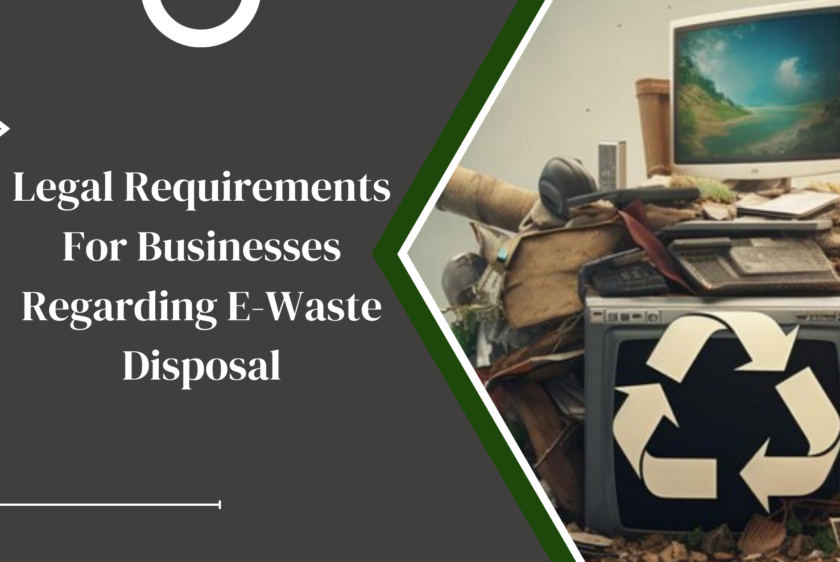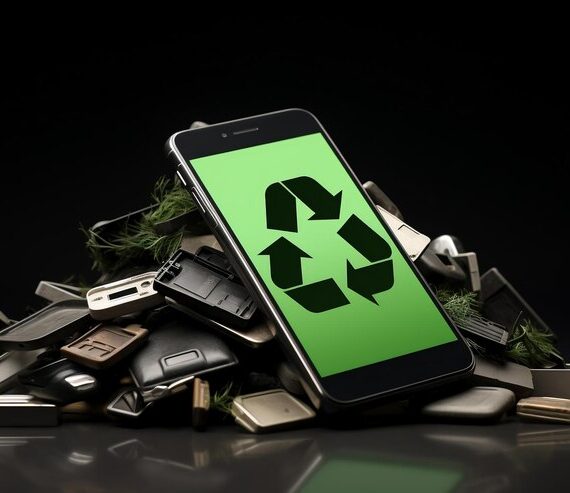
What Are The Legal Requirements For Businesses Regarding E-Waste Disposal?
In the age of relentless technological progress, businesses are continually upgrading their electronic devices to stay competitive. However, the rapid pace of innovation has given rise to a significant environmental concern – electronic waste, or e-waste. E-waste disposal has become a critical issue, prompting governments worldwide to enact regulations and standards that businesses must adhere to. In this blog post, we’ll explore the legal obligations businesses face in terms of e-waste disposal, covering key aspects such as regulations, compliance standards, and environmental considerations.
Legal Requirements that Each Business Should Know

1. Familiarize Yourself With Regulations:
Businesses engaging in the production, sale, or use of electronic devices must be aware of and comply with the relevant e-waste disposal regulations in their respective regions. For example, in the European Union, the Waste Electrical and Electronic Equipment (WEEE) Directive outlines the responsibilities of manufacturers, distributors, and consumers regarding the proper disposal of electronic products. In the United States, the Resource Conservation and Recovery Act (RCRA) governs the management and disposal of hazardous waste, including certain types of e-waste.
2. Compliance Standards and Certification:
In addition to legal regulations, businesses must adhere to industry-specific compliance standards and certifications to demonstrate their commitment to responsible e-waste disposal. ISO 14001, an international standard for environmental management systems, provides a framework for businesses to establish and maintain an effective environmental management system, including e-waste disposal practices. Certifications such as e-Stewards and R2 (Responsible Recycling) are specific to the electronics recycling industry and ensure that businesses comply with ethical and environmental best practices.
3. Proper Collection and Handling of E-Waste:
Businesses must establish effective systems for the collection, transportation, and handling of e-waste. This includes implementing secure methods to protect sensitive information stored on electronic devices. Collaborating with certified e-waste recyclers and disposal facilities is crucial to ensuring that the materials are processed in an environmentally friendly manner while adhering to legal and ethical standards.
4. Extended Producer Responsibility (EPR):
Many jurisdictions are adopting Extended Producer Responsibility (EPR) programs, shifting the burden of responsible e-waste disposal from consumers to the manufacturers and importers of electronic products. Under EPR, businesses are required to take responsibility for the whole lifecycle of their products, from production to end-of-life disposal. This approach encourages manufacturers to make products with recycling in mind and establishes financial incentives for proper disposal methods.
5. Environmental Considerations:
Beyond legal and regulatory obligations, businesses should also consider the environmental impact of their e-waste disposal practices. Electronics often contain hazardous materials, including heavy metals and toxic chemicals, which can leach into the soil and water if not properly handled. Using responsible methods for throwing things away, such as recycling and treating waste properly, helps protect the environment and supports sustainable habits.
Best Practices for Businesses:
Businesses should implement the following best practices to ensure compliance with legal obligations and promote environmentally responsible practices.
1. Establish an E-Waste Management Plan: Develop a comprehensive plan outlining how the company will handle the disposal of electronic equipment, from procurement to end-of-life.
2. Employee Training: Educate employees on the proper procedures for handling and disposing of electronic equipment, emphasizing the importance of recycling and responsible waste management.
3. Collaborate with Certified Recyclers: Partner with reputable e-waste recycling facilities that adhere to industry standards and certifications, ensuring electronic equipment’s safe and ethical disposal.
4. Documentation and Reporting: Maintain accurate records of e-waste disposal activities, including the volume and destination of disposed items. Regularly report to regulatory authorities to demonstrate compliance.
Final Decision Is Yours!
Businesses are legally obligated to adhere to regulations and standards governing e-waste disposal to mitigate environmental impact and foster sustainable practices. By understanding and complying with these obligations, companies can avoid legal consequences and contribute to a healthier and more sustainable future. Responsible e-waste management is not just a legal requirement but a moral and environmental imperative that every business must prioritize.
Read Our More Blogs:
8 Easy Steps to Comply with New E-Waste Regulations
Cost-Effective Strategies For Businesses To Manage Their E-Waste
Follow us:







